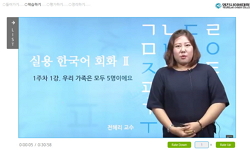Consumer responses to brand names are determined not only by what they mean but also by how they sound(i.e., sound symbolism). Perception of product attributes depends partly on sound symbolism of the brand name if it is a nonword. Prior researches on...
http://chineseinput.net/에서 pinyin(병음)방식으로 중국어를 변환할 수 있습니다.
변환된 중국어를 복사하여 사용하시면 됩니다.
- 中文 을 입력하시려면 zhongwen을 입력하시고 space를누르시면됩니다.
- 北京 을 입력하시려면 beijing을 입력하시고 space를 누르시면 됩니다.

무의미 조어 브랜드명의 음성 상징에 따른 소비자 반응 연구- 국어 음성 상징을 중심으로 - = A Study on Consumer Responses to the Sound Symbolism of Nonword Brand Names - Pertaining to Korean Sound Symbolism -
한글로보기부가정보
다국어 초록 (Multilingual Abstract)
The purpose of this study was to investigate the Korean consumers’ brand choice responses to the sound symbolism of nonword brand names made of Korean vowels and consonants. The survey, based on questionnaire, was used to conduct this research. The data were complied and analyzed using χ²-test.
It was revealed that (a) there were significant differences in consumers’ brand choice responses to the sound symbols of the brand names between with Korean bright and with dark vowels. Products with brand names made of Korean bright vowels have more dynamic, light, clear, small, sharp, thin, fast, little, and weak attributes compared to dark ones. (b) products with the brand names made of Korean dark vowels have more reversed attributes compared to bright ones. (c) there were relatively significant differences in consumers’ brand choice responses to the sound symbols of the brand names with among different consonants in Korean. Products with the brand names made of slightly aspirated consonants in Korean have more soft and mild attributes compared to heavily aspirated and unaspirated ones. (d) products with the brand names made of unaspirated consonants in Korean have more strong, hard, and rough attributes compared to slightly aspirated and heavily aspirated ones. (e) Products with the brand names made of voiced consonants in Korean possess more soft, happy, and feminine attributes compared to voiceless consonants. Additionally, theoretical and managerial implications of brand naming using Korean sound symbolism based on this study are discussed.
Consumer responses to brand names are determined not only by what they mean but also by how they sound(i.e., sound symbolism). Perception of product attributes depends partly on sound symbolism of the brand name if it is a nonword. Prior researches on sound symbolism of the brand names have been conducted mainly on American consumers’ brand responses to the English brand names. So, little research to date has been performed to examine Korean consumers’ reactions to the sound symbols of the brand names made of Korean vowels and consonants.
The purpose of this study was to investigate the Korean consumers’ brand choice responses to the sound symbolism of nonword brand names made of Korean vowels and consonants. The survey, based on questionnaire, was used to conduct this research. The data were complied and analyzed using χ²-test.
It was revealed that (a) there were significant differences in consumers’ brand choice responses to the sound symbols of the brand names between with Korean bright and with dark vowels. Products with brand names made of Korean bright vowels have more dynamic, light, clear, small, sharp, thin, fast, little, and weak attributes compared to dark ones. (b) products with the brand names made of Korean dark vowels have more reversed attributes compared to bright ones. (c) there were relatively significant differences in consumers’ brand choice responses to the sound symbols of the brand names with among different consonants in Korean. Products with the brand names made of slightly aspirated consonants in Korean have more soft and mild attributes compared to heavily aspirated and unaspirated ones. (d) products with the brand names made of unaspirated consonants in Korean have more strong, hard, and rough attributes compared to slightly aspirated and heavily aspirated ones. (e) Products with the brand names made of voiced consonants in Korean possess more soft, happy, and feminine attributes compared to voiceless consonants. Additionally, theoretical and managerial implications of brand naming using Korean sound symbolism based on this study are discussed.
동일학술지(권/호) 다른 논문
-
- 대한경영학회
- 김영구(Kim, Young-Gu)
- 2002
- KCI등재후보
-
- 대한경영학회
- 곽원일(Kwak, Won-Il)
- 2002
- KCI등재후보
-
소비자와 소매점간의 관계품질의 영향요인과 효과에 관한 연구
- 대한경영학회
- 김영아(Kim, Young-Ah)
- 2002
- KCI등재후보
-
웹 상에서의 정보검색 효율성 제고를 위한 검색결과 제시방법의 개선 방안
- 대한경영학회
- 박철제(Park, Chul-Jae)
- 2002
- KCI등재후보
분석정보
인용정보 인용지수 설명보기
학술지 이력
| 연월일 | 이력구분 | 이력상세 | 등재구분 |
|---|---|---|---|
| 2026 | 평가예정 | 재인증평가 신청대상 (재인증) | |
| 2020-01-01 | 평가 | 등재학술지 유지 (재인증) |  |
| 2017-01-01 | 평가 | 등재학술지 유지 (계속평가) |  |
| 2014-01-14 | 학술지명변경 | 외국어명 : Korea Journal of Business Administration -> Korean Journal of Business Administration |  |
| 2014-01-09 | 학술지명변경 | 외국어명 : 미등록 -> Korea Journal of Business Administration |  |
| 2013-01-01 | 평가 | 등재 1차 FAIL (등재유지) |  |
| 2010-01-01 | 평가 | 등재학술지 유지 (등재유지) |  |
| 2008-01-01 | 평가 | 등재학술지 유지 (등재유지) |  |
| 2005-05-30 | 학회명변경 | 영문명 : Daehan Association Of Business Administration Korea (Daba) -> DAEHAN Association of Business Administration, Korea (DABA) |  |
| 2005-01-01 | 평가 | 등재학술지 선정 (등재후보2차) |  |
| 2004-01-01 | 평가 | 등재후보 1차 PASS (등재후보1차) |  |
| 2002-01-01 | 평가 | 등재후보학술지 선정 (신규평가) |  |
학술지 인용정보
| 기준연도 | WOS-KCI 통합IF(2년) | KCIF(2년) | KCIF(3년) |
|---|---|---|---|
| 2016 | 1.26 | 1.26 | 1.44 |
| KCIF(4년) | KCIF(5년) | 중심성지수(3년) | 즉시성지수 |
| 1.53 | 1.53 | 2.107 | 0.23 |




 KCI
KCI







